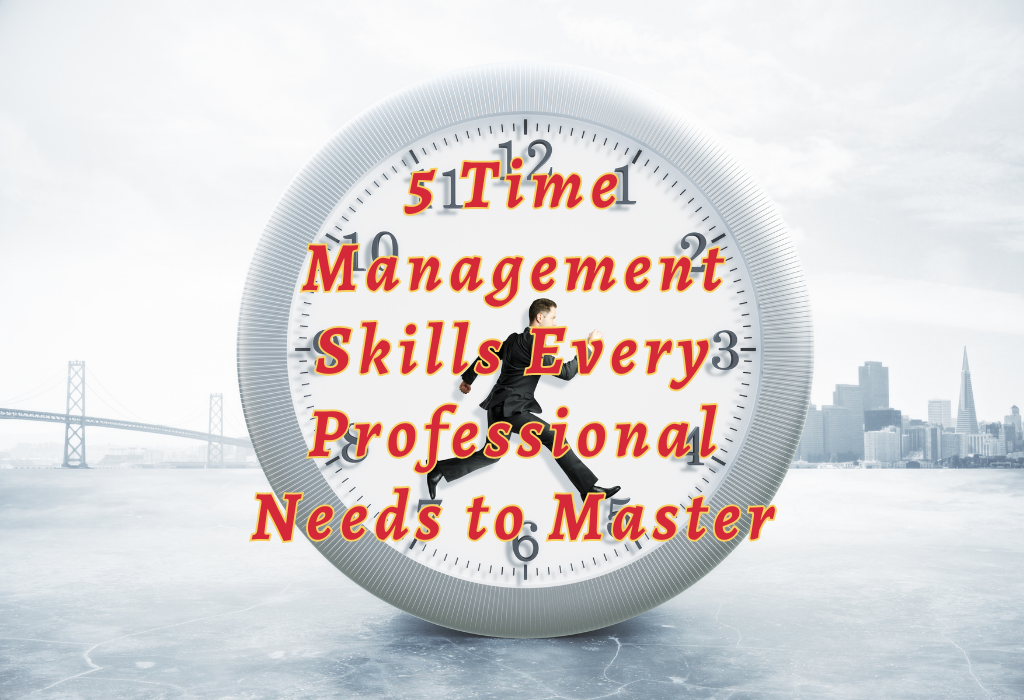5 Time Management Skills Every Professional Needs to Master
Time management skills are essential for business owners, professionals and entrepreneurs to succeed in their daily operations. The ability to prioritize tasks, set deadlines and goals, manage interruptions and distractions effectively, and utilize technology to automate processes is vital to staying productive throughout the day. But knowing how best to do these things can be a challenge.
This blog post will explore some of the essential time management skills needed to stay on top of your workload while maintaining a healthy work-life balance. From prioritizing tasks and setting achievable goals to delegating responsibilities whenever possible, get ready for expert tips on optimizing your schedule.

Time Management and Its Importance
Time management allows you to be more productive and efficient in your work while also helping you live a more fulfilling life.
Benefits of Time Management
5 Time Management Skills
Here we are going to discuss top 5 time management skills that will help you perform better:
Prioritize Your Tasks
Prioritizing tasks is an essential time management skill for busy professionals, entrepreneurs and business owners. Here are some steps you can take to prioritize your tasks.
A to-do list can help you keep track of all your daily activities and prioritize them according to their urgency or importance. It’s best practice to break big projects into smaller tasks, making them easier to manage and complete promptly. Writing out each mission on paper or using an app like Trello can also help ensure nothing slips through the cracks.
Once you have created your list, it’s time to start prioritizing the items on it by assigning each one with a level of importance (high, medium or low). This will allow you to focus on completing the most urgent tasks first while leaving room for less pressing matters later in the day if needed.
By taking the time to prioritize your tasks and break down big projects into smaller, more manageable pieces, you can create a clear plan of action that will help you stay on track and reach your goals. Now let’s look at how setting deadlines and goals can further improve your time management skills.
Set Deadlines and Goals
Setting deadlines and goals are essential for staying on track with your work. Follow the tips and set your goals in a better way.
Creating short-term and long-term goals can help you stay focused on what needs to be done. Short-term goals must be accomplished within a few weeks or months, such as completing a project by its due date or meeting weekly sales targets. Long-term goals require more time, such as launching a new product line or increasing market share over several years. Setting both types of objectives will keep you organized and ensure that all necessary steps are taken towards achieving success in your professional endeavours.
Once you have established your short-term and long-term objectives, setting realistic deadlines for each associated task is essential. This will give you an idea of how much time is needed to complete each step along the way, allowing you to plan accordingly so that nothing falls through the cracks when working towards achieving your ultimate goal(s). When setting these deadlines, make sure they’re achievable yet challenging enough so that Progress is made without feeling overwhelmed by too many expectations at once.
Tracking Progress throughout the process allows you to identify areas where adjustments may need to be made if something isn’t going according to plan or if there has been an unexpected delay in reaching certain milestones. It also gives you insight into which strategies are working best so that similar approaches can be used again in future projects or initiatives when applicable. By monitoring Progress regularly and making necessary changes based on results achieved thus far, you can stay one step ahead of potential roadblocks or other issues that could derail your efforts altogether if not addressed promptly and appropriately from the start.
Manage Interruptions and Distractions
Interruptions and distractions can be significant time wasters for busy professionals. It’s essential to find ways to reduce these disruptions to maximize productivity. Here are some tips on how to manage interruptions and distractions:
One of the most effective ways to minimize distractions is by turning off notifications from emails, texts, social media apps, etc., during work hours. This will help you stay focused on the task without being pulled away by constant alerts or notifications that may take your attention away from what you should be doing.
Stressful situations can also lead to distraction as it takes our focus away from our tasks. Taking a few minutes throughout the day for self-care activities such as meditation or deep breathing exercises can help reduce stress levels so that we can remain productive throughout the day.
Regular breaks throughout the day help us recharge mentally so that we don’t become overwhelmed with too much work at once. Taking short walks outside or listening to music are great ways of taking a break while still staying productive since they allow us to refocus our energy on completing tasks more efficiently when we come back refreshed after a pause.
By following these tips, busy professionals can better manage their time and significantly increase productivity.
Utilize Technology to Automate Processes & Streamline Workflows
Technology can be a great asset when managing your time effectively. Investing in time management software or apps is an easy way to track tasks and deadlines more efficiently. These tools are designed to help you stay organized, prioritize tasks, and keep on top of deadlines so that you don’t miss any important dates. Additionally, many of these programs come with features such as reminders, notifications, and analytics which can provide insight into how productive you are throughout the day.
Using automation tools is another great way to save time on repetitive tasks. Automation eliminates manual labour by automating processes such as data entry or customer service inquiries so that employees can focus their energy on more critical aspects of the business. This saves time and increases accuracy since automated systems significantly reduce human error compared to manual processes.
You can save time and energy on tedious tasks by utilizing technology to automate processes and streamline workflows. Now let’s look at how delegating responsibilities can help maximize efficiency even further.
Delegate Responsibilities Whenever Possible
Delegating responsibilities is essential to managing your time efficiently as a professional or business owner. Assigning tasks to team members based on their strengths and skill sets can help ensure that the right people are doing the right jobs, freeing up more of your own time for core business activities.
When assigning tasks, it’s essential to consider each individual’s abilities and experience level to ensure they have the necessary tools and resources to complete their work successfully. It’s also beneficial to provide clear instructions on what needs to be done so that everything is clear about expectations and deadlines.
Outsourcing non-essential tasks can also free up more of your own time for other projects. This could include hiring virtual assistants, freelancers, or third-party companies specializing in certain areas, such as web design or marketing services. You can focus on what matters most by outsourcing these tasks – running your business.
Finally, regularly monitoring delegated projects’ Progress is vital when delegating responsibilities. Regular check-ins with team members allow you to stay informed about how things are progressing while providing feedback if necessary. This will help ensure that all assigned tasks are completed accurately and on schedule, saving you valuable time in the long run.
Frequently Asked Questions
Conclusion
By prioritizing tasks, setting deadlines and goals, managing interruptions and distractions, utilizing technology to automate processes & streamline workflows, and delegating responsibilities whenever possible, you can maximize your time management skills. With the right tools, you can increase productivity while still having time for yourself.
Does it always need to be more time in the day? Need help keeping up with deadlines and juggling multiple tasks at once? Schedulemakeover.com provides time management expert tips and tools to help you optimize your schedule, increase productivity, manage projects more effectively, and boost business productivity – all while leading a more fulfilling life! Stop struggling and take control of your time today. Visit us now for solutions tailored just for you!





